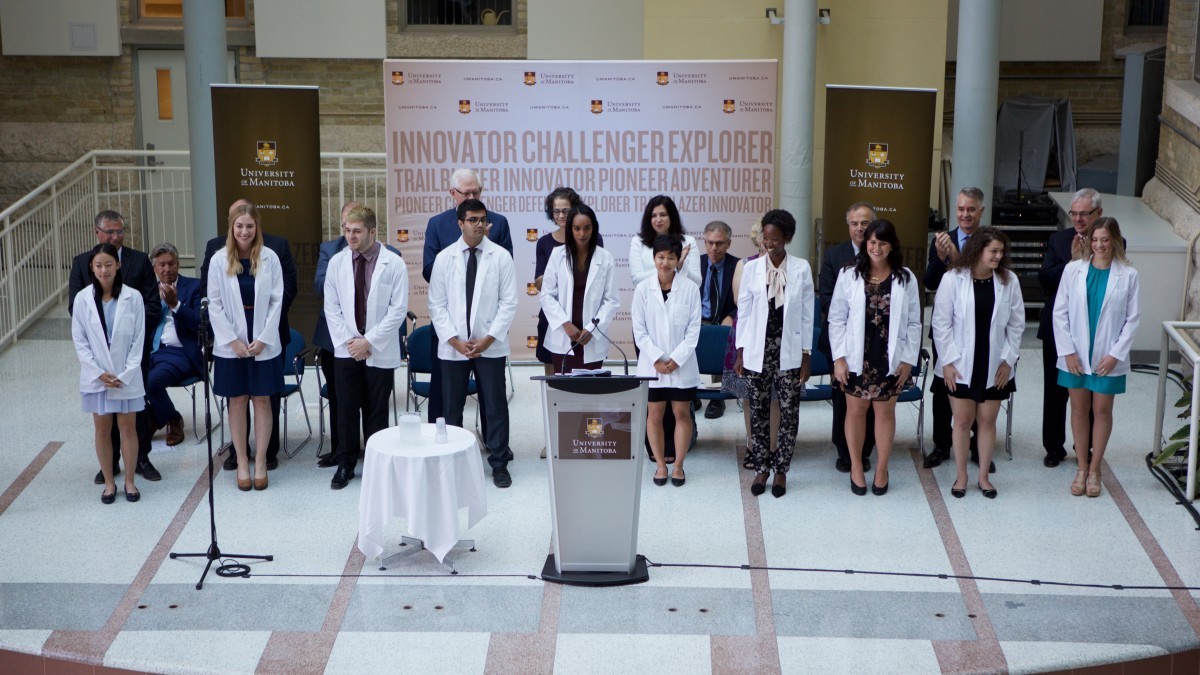
Students from the Med Class of 2020 receive their inaugural white coat.
Med students urged to speak out for health policy, show humility
Medical students should pay attention to health-care policy and speak out if they see politicians heading down the wrong path, Gary Doer, former premier of Manitoba, told the incoming class at the Max Rady College of Medicine this week.
“There’s been mistakes made on policy by elected leaders,” Doer said in his Alan Klass Memorial Address to the Medicine Class of 2020 during inaugural exercises. “So stay engaged in the debate. . . . If you see [mistakes], speak out and speak up.”
It takes humility to admit mistakes, said Doer, who recently completed a term as Canada’s ambassador to the United States after serving as Manitoba’s premier from 1999 to 2009.
As an example of flawed policy, he recalled that in the 1990s, premiers across Canada tried to address soaring health-care costs by reducing the number of students admitted to medical schools. A decade later, he said, it was clear that the cutting had led to longer and longer patient waiting lists.
Humility, compassion and responding to diversity were recurring themes at the Aug. 24 event on the Bannatyne Campus, which Doer called “a joyous day.” The ceremony included the formal cloaking of 110 new medical students in their first white coats and recital of the Hippocratic Oath.
The class, which is 97 per cent Manitoban and equally split between men and women, includes 12 students of self-declared Indigenous ancestry, three French-speaking bilingual students, three MD/PhD students and 29 students with rural attributes.
“We will teach you how to become physicians in terms of knowledge and skills,” said Dr. Brian Postl, dean of the Max Rady College of Medicine; dean, Rady Faculty of Health Sciences and vice-provost (health sciences). “That, frankly, is the easy part. It’s acquiring the capacity to listen, to be empathetic, to undertake a life of service with humility, that is more difficult.
“Issues of gender, poverty, inequality and racism will all manifest in your day-to-day clinical work. We expect you to work to make it better.”
Margaret Lavallee, elder-in-residence for the Rady Faculty of Health Sciences, told the future doctors: “You are warriors of medicine.”
Glennis Bushie, a first-year medical student from Peguis First Nation, noted that the Hippocratic Oath to practise medicine ethically has much in common with the Indigenous Seven Teachings, which include humility, respect, love, courage, honesty, wisdom and truth.
Bushie made a “pinkie promise” in 2013 to her five-year-old daughter, Chloe, to persevere and become a doctor. After Chloe died suddenly in 2014, Bushie wrote the MCAT in her memory. While receiving her inaugural white coat, Bushie wore moccasins in her daughter’s favourite colour, purple, as well as a skirt adorned with a butterfly, a symbol of transformation.
“Struggle is what gives you the strength to carry on,” said Bushie, who is determined to transform sorrow into hope and deliver medical care to Manitoba First Nations.
Amir Ali’s journey to medical school involved a difficult decision about trading his U of M Bisons basketball uniform for a white coat. Ali, raised in Winnipeg by immigrant parents from Ethiopia, seriously injured his knee in 2014 and had surgery, ruining what was to be his final year as a varsity athlete.
Ultimately, he received permission to defer entrance into the Max Rady College of Medicine and play for one more year. After spending last season pouring his focus and drive into basketball, the 23-year-old took the Hippocratic Oath with no regrets. He plans to become fluent in French, Spanish, Arabic and his Ethiopian language so he can work as a doctor in international crisis zones.
“It felt like a new beginning, moving into my profession,” Ali said. “The oath was probably the most emotional part.”
CJOB’s Geoff Currier spoke to Glennis Bushie and Amir Ali, two exceptional young people who plan to use their medical skills in four years.






